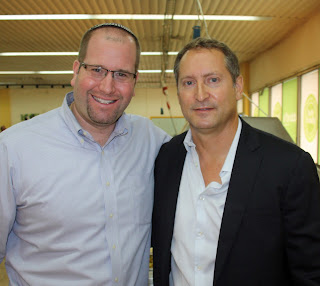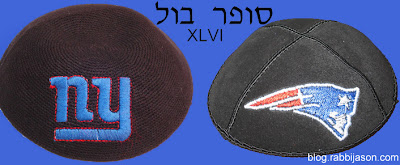At the core of this ethic for environmental stewardship is the concept of bal tashchit – the ban on wonton destruction of the earth’s resources. This environmental principle, which includes waste reduction, should be a focus on the holiday of Tu Bishvat.
| Daniel Birnbaum of SodaStream speaking to Conservative rabbis in Israel |
This value was articulated in a presentation I heard last month while I was visiting Israel. Together with a dozen of my rabbinic colleagues, we toured the headquarters of SodaStream, the makers of consumer home carbonated water products. Daniel Birnbaum, the CEO of publicly traded SodaStream, explained to our group the positive environmental impact of his products. “This is the new way to do soda. We’re revolutionizing it with a smarter way to enjoy soft drinks.”
In his presentation to our group, Birnbaum showed how SodaStream reduces the amount of packaging waste from cans and bottles. The company, he explained, also eliminates much of the pollution caused by the transport of bottled beverages. SodaStream has sponsored initiatives promoting waste reduction and improved quality of tap water. In his PowerPoint presentation, Birnbaum explained the alarming statistic that “460 billion bottles and cans manufactured every year, of which the vast majority are dumped as waste across parks, oceans and landfills.”
 |
| With SodaStream’s Daniel Birnbaum at the Mishor Adumim production facility |
In its most aggressive marketing campaign alerting the international community to the negative effects of plastic bottle waste, SodaStream displayed a 318-square foot cage in several countries. The cage contained 10,657 empty bottles and cans showing that the waste produced by one family over the course of five years from beverage containers can be replaced by a single SodaStream bottle. The “Cage Campaign” has now been on display in over 30 countries.
This aggressive marketing campaign erupted into controversy when one of SodaStream’s cages was erected in Johannesburg, South Africa in 2012. Coca-Cola demanded that SodaStream remove all of the empty products from the cages bearing Coca-Cola’s trademark logos and threatened to sue SodaStream if they didn’t comply. Birnbaum not only rebuffed Coca-Cola’s demands, but he went on the offensive by ordering the display of one of those cages right outside Coca-Cola’s headquarters in Atlanta.
Controversy is obviously something Birnbaum isn’t afraid of. Over the years he has taken a lot of heat for the location of SodaStream’s world headquarters in the territories outside of Jerusalem in the West Bank settlement of Mishor Adumim. The European Union’s highest court ruled in 2010 that SodaStream was not entitled to claim a “Made in Israel” exemption from EU customs payments because of the company’s primary manufacturing plant is technically located outside of Israel. Human right’s groups like Peace Now have long objected to SodaStream’s operations in the territories and publicly disparage SodaStream on the web.
Pro-Palestinian activists who advocate consumer boycotts of goods produced outside of Israel’s green line have protested SodaStream around the globe, saying the company has profited from Israel’s occupation of the West Bank. They say Palestinian workers suffer from low wages and poor working conditions at SodaStream, but Birnbaum argues that none of that is true. For his part, Birnbaum claims he is a strong proponent of human rights, and that thanks to SodaStream thousands of local Palestinians in Mishor Adumim have good paying jobs. Those workers, he explains, would not be able to support their families without their jobs in SodaStream’s manufacturing plant.
In an effort to capitalize on SodaStream’s success, Birnbaum will be spending approximately $3.8 million on a 30-second spot during next month’s Super Bowl. Its recent “Setting the Bubbles Free” commercial, showing hundreds of soft drink bottles exploding when a person uses a SodaStream machine, was banned in the UK when television advertising monitoring agency Clearcast argued that it denigrates the bottled drink industry. Birnbaum is considering legal action in the UK and has countered publicly by asking, “Are we really being censored for helping to save the environment? This might be the first time in the world when an environmental approach has been shut down by the media to protect a traditional industry.” It will be interesting to see what Birnbaum and SodaStream have in store for the over 111 million Super Bowl viewers around the world.
I was quite impressed listening to Birnbaum speak passionately about SodaStream’s products and its environmental concern for the global good. The former CEO of Nike Israel (he also gained experience at Pillsbury and Procter & Gamble), was raised in a home in which strong Jewish values were preached. Birnbaum’s father was a Conservative rabbi who emphasized the importance of the State of Israel and philanthropic giving (Birnbaum is a major donor to the Masorti Judaism, the Conservative Movement’s Israeli affiliate). While Birnbaum, a Harvard MBA, is committed to his life as an executive businessman, he also gets a chance to participate as a leader in a synagogue for a few days each year. He travels to Cincinnati to serve as the High Holiday cantor of Adath Israel Congregation each Rosh Hashanah and Yom Kippur along with his wife Bat Ella, an accomplished Israeli musician.
 |
| Daniel Birnbaum with the High Holiday choir at Adath Israel Congregation |
As Tu Bishvat approaches, I would encourage people to learn more about SodaStream and its positive impact on the environment. Yes, it is a publicly traded company on the NASDAQ with major investors and a goal of becoming a billion dollar company, but it also has a vision based on the Jewish concept of Tikkun Olam — improving our earth. SodaStream will never be loved by the BDS (boycot-divest-sanction) movement, pro-Palestinian groups, or the big soda corporations like Coke and Pepsi. However, it is making a great product, putting thousands of at-risk Palestinians into the work force, and trying to make an impact in reducing the world’s waste from bottles and cans.
I guarantee that after SodaStream’s Super Bowl commercial airs, Daniel Birnbaum will be the topic of conversation around the world. He’s a guy who should be admired, not denigrated. So on this Tu Bishvat I hope people drink a soda water L’chayim to Daniel Birnbaum, set the bubbles free, and pledge to help eliminate waste caused by all those unnecessary plastic bottles that are ruining our environment. Happy Tu Bishvat!

